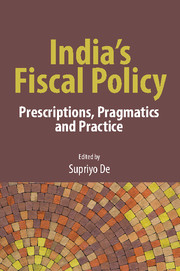Book contents
- Frontmatter
- Contents
- Foreword
- Acknowledgements
- Disclaimer
- Introduction: Contours of the Indian Fiscal Policy Debate
- 1 Fiscal Policy in India: Trends and Trajectory
- 2 Decentralization, Indirect Tax Reform and Fiscal Federalism in India
- 3 Fiscal Implications of Energy Subsidies
- 4 Fiscal Implications of Food Security in India: A Critical Review
- 5 Land and Food Acts: Trading Economic Pragmatism for Political Gain
- 6 A Separate Debt Management Office in India
- 7 Show Me the Cash: Direct Benefits Transfer in India
- 8 India's Education Challenges: Expenditure Effectiveness Issues
- List of Contributors
- Index
Introduction: Contours of the Indian Fiscal Policy Debate
Published online by Cambridge University Press: 23 July 2017
- Frontmatter
- Contents
- Foreword
- Acknowledgements
- Disclaimer
- Introduction: Contours of the Indian Fiscal Policy Debate
- 1 Fiscal Policy in India: Trends and Trajectory
- 2 Decentralization, Indirect Tax Reform and Fiscal Federalism in India
- 3 Fiscal Implications of Energy Subsidies
- 4 Fiscal Implications of Food Security in India: A Critical Review
- 5 Land and Food Acts: Trading Economic Pragmatism for Political Gain
- 6 A Separate Debt Management Office in India
- 7 Show Me the Cash: Direct Benefits Transfer in India
- 8 India's Education Challenges: Expenditure Effectiveness Issues
- List of Contributors
- Index
Summary
Fiscal policy has gained salience amidst the challenges facing policymakers in the post-crisis world. As the title suggests, this book seeks to balance normative prescriptions on fiscal policy with its practical aspects in the context of the Indian scenario. In doing so, it brings together views of leading experts from academic and policy spheres. This book seeks to highlight the specificities of Indian fiscal policy (which are often not covered by conventional ‘text book’ approaches) to provide readers with a conceptual base as also bring them abreast with the most recent developments. Current issues like the impact of development expenditures, the challenge of reducing subsidies and political economy aspects are focussed upon. Considering rapid developments in the field, especially following the fiscal stimulus of 2008, subsequent attempts at fiscal consolidation and the formation of the NDA government, a fresh look into India's fiscal policy is warranted.
This book is different from others on the subject in terms of its focus on policy and political considerations, which have gained increasing importance in the Indian context. This is driven by the very obvious observation that divergences between prescribed fiscal policy options and actual practices, quite evident in most countries, are even more prolific in the Indian context. For instance, professional economists unanimously endorse a nation-wide goods and services tax (GST) and the need to curb subsidies. Yet, India's GST legislation process dragged on for many years while energy subsidies persist and food subsidy commitments were enhanced recently. These aspects are discussed threadbare in some of the chapters (Chapters 2–4). In debatable policy issues such as the separation of debt management from central banking, agreement and action seem to evade us forever (Chapter 6). It also adopts a wider approach for the analysis of fiscal policy by taking into consideration aspects such as political motivations and, the effectiveness and targeting of social expenditures, which are essential for a critical analysis of the Indian policy matrix (discussed in Chapters 5, 7 and 8).
- Type
- Chapter
- Information
- India's Fiscal PolicyPrescriptions, Pragmatics and Practice, pp. xi - xviPublisher: Cambridge University PressPrint publication year: 2016



